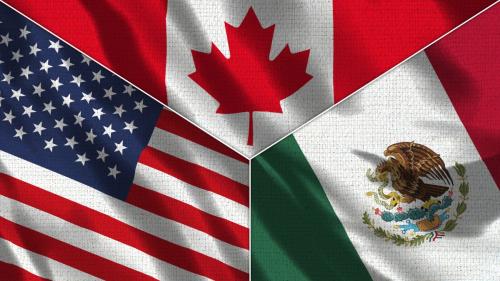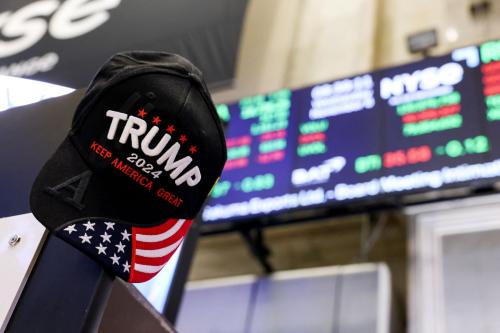This is a viewpoint from the USMCA Forward 2023 report where experts dive into the opportunities and complementary actions needed to build more integrated, resilient, and secure supply chains in North America.
 Mexico is called upon to be an essential partner in bringing dynamism, competitiveness, and resilience to North American production and in reaching its ambitious decarbonization goals. With an economy closely integrated with that of the United States, Mexico has much to gain from the relocation of production to serve the U.S. market. Yet, Mexico is at risk of missing this unique opportunity, as the López Obrador Administration has thus far failed to understand the primacy of climate objectives of its North American partners and of the firms interested in setting their operations in Mexico—and the role clean energies play in this equation.
Mexico is called upon to be an essential partner in bringing dynamism, competitiveness, and resilience to North American production and in reaching its ambitious decarbonization goals. With an economy closely integrated with that of the United States, Mexico has much to gain from the relocation of production to serve the U.S. market. Yet, Mexico is at risk of missing this unique opportunity, as the López Obrador Administration has thus far failed to understand the primacy of climate objectives of its North American partners and of the firms interested in setting their operations in Mexico—and the role clean energies play in this equation.
Indeed, Mexico’s current energy policies promote the use of fossil fuels, undermine the electricity market, and hinder the deployment of renewable energies. These measures likely inconsistent with USMCA commitments have also led the U.S. and Canada to seek formal consultations with Mexico under the USMCA dispute settlement mechanism. The stakes are high. Since 2020, sustainability has evolved into a critical business objective. Companies are accelerating the implementation of strategies to meet their environmental, social, and governance commitments aligned to the 2030 Agenda, while regulation is mandating compliance. The issue is not one of overriding nationalistic sentiment, but of understanding the profound redefinition of economic processes and relations to advance climate commitments.
In 2022, geopolitical tensions accelerated the relocation of supply chains from global to regional markets, a movement bolstered over the pandemic, as it uncovered the limits of overseas manufacturing dependency. The quest for resilience to de-risk production of goods and services, particularly those considered essential to national security, is bringing about prospects for nearshoring that could deepen North American integration and ignite an era of prosperity. Conditions seem ideal. North America offers prime geostrategic location, abundant and diverse natural resources, skilled talent, a sizable market, and an economy amid a profound decarbonization, sustained by the prospects of greater integration under the USMCA.
With an economy closely integrated with that of the United States, Mexico has much to gain from the relocation of production to serve the U.S. market. Yet, Mexico is at risk of missing this unique opportunity.
Mexico stands to gain as businesses look to relocate production from Asia, particularly from China. Mexico’s integrated border with the U.S., competitive labor force, established logistic chains, fiscal incentives, and the USMCA framework are the basis for new investments into Mexico and deepening North American supply chains. This would build on a vast platform of production of sophisticated goods in electronics, auto parts, aerospace, transportation, and medical equipment. Additionally, Mexico could be a base for exports globally—it has in place 14 free trade agreements with 50 countries, 30 investment promotion and protection agreements.
Nearshoring presents Mexico with a golden opportunity to revitalize its industrial platform, modernize its infrastructure, grow its skilled labor force, create well-paid jobs, and significantly decarbonize and boost its economy. At the recent North American Summit, the partners agreed to relocate 25 percent of Asian imports to North America, adding up to 2 percent GDP growth to Mexico. According to financial analysts, over the next decade, between $60 billion and $150 billion could flow into Mexico as part of the efforts to move production closer to consumption centers. In 2022, $30 billion in investments have been allocated in strategic sectors, such as semiconductors manufacturing and advanced packaging, critical minerals mining, batteries, electric vehicles, logistics, and medical supplies.
Yet, those prospects could be stalled by Mexico’s growing inability to supply firms with clean energy, an essential precondition for companies with net-zero commitments and a distinct priority for the U.S. and Canada as both partners accelerate the pace to decarbonize their economy.
Indeed, while climate policy is a keystone of the Biden and Trudeau administrations, President Lopez Obrador sees oil as the driver of economic development. Whereas Mexico builds a refinery and burns fuel oil, the U.S. government enacts ambitious climate policies to cut emissions by half by 2030 and reach carbon neutrality by 2050.
For the first time in decades, the U.S. government is defining industrial policy, based on the premise of “Making more in America” with domestic technologies, local manufacturing lines, ensuring that critical strategic products are produced locally. With the Bipartisan Infrastructure Law, the U.S. is embracing the Fourth Industrial Revolution, in which clean energy technologies are at the center of the transformation and the redesign of the economy for a sustainable future, all of it supported by the Infrastructure Reduction Act and its allocation of $365 billion for energy security and climate change programs.
Likewise, the private sector has accelerated the implementation of its sustainability goals. Firms are compelled to comply with strict climate regulation, demanding suppliers to adhere to targets, regardless of geographic location. The financial and insurance sectors are tightening the requirements to back projects.
Mexico is at the crossroad. To appease its trade partners, it has issued updated climate commitments and announced landmark projects to generate and export solar energy. Yet, rhetoric needs to be paired with concrete actions. Allowing the economic dispatch of the electricity market and the operation of renewable plants would instantly add 800 MW of low-cost clean energy, a much sought-after resource by companies relocating in Mexico.
The resolution of consultations under USMCA on energy will determine whether Mexico is a full-fledged member of North America or gives up the opportunity to become anew a dynamic economy and reliable partner.






Commentary
Mexico at the crossroads: The golden opportunity of nearshoring and energy policy as its Achilles’ heel under USMCA
Tuesday, February 28, 2023